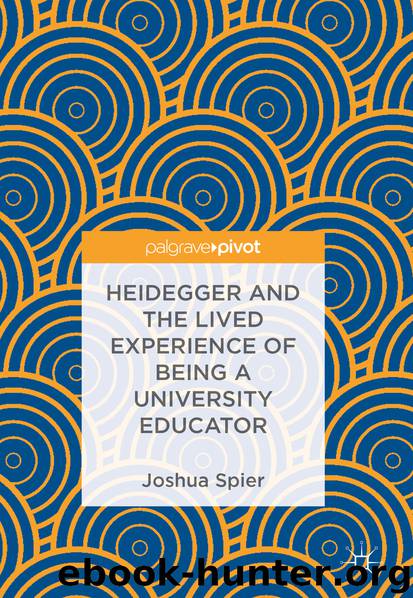Heidegger and the Lived Experience of Being a University Educator by Joshua Spier

Author:Joshua Spier
Language: eng
Format: epub
Publisher: Springer International Publishing, Cham
Keywords
Lived timeHaving-been-ness (Gewesenheit)HeideggerLiving pastUniversity educatorsHistoricality/historicise
To be an educator in higher education is always to exist as an ‘I-have-been’ (Heidegger, 1962, p. 373). An educator’s own ‘having-been-ness’ never passes away but continues in how they are (Heidegger, 1988, p. 265). In this chapter, university educators’ stories are interpreted to reveal that an ontological interplay, in relation to an educator’s own having-been-ness, is taken for granted. An educator swept up in the hectic flow of teaching and working in their university world is always comporting themselves in some way to what they themselves have already been, whether consciously or not (Heidegger, 1988, p. 265). This chapter focuses on different ways university educators may experience an essential ontological interplay between the veiling and unveiling of their own past as meaningful to their present and future possibilities with others (Harman, 2007, p. 3).
Unlike an item of clothing that we can simply discard, as humans, our living past is not something we can get rid of any more than we can escape our own death (Heidegger, 1988, p. 265). Regardless of whether we remember or fail to remember some specific detail from our past, our background sense of being a person who has been remains intact (Heidegger, 1962, p. 387; Heidegger, 1988, p. 265).1 Heidegger’s notion of having-been-ness (Gewesenheit) does not mean that we are bound by our past lives, but that each of us carries a largely taken-for-granted sense of ‘my own’ having-been, which is constantly informing our self-understandings and activities (Heidegger, 1962, pp. 32–33, 1966, p. 265). Moreover, as human beings, the very issue of our own having-been can show up differently in different lights, as mattering and not mattering to oneself and others, as we go about our everyday lives (Leonard, 1994, p. 54; Thomson, 2011, p. 83).2
According to this insight, meanings of our own having-been are never set in stone, but are constantly coming to meet us in fresh ways (Dahlstrom, 2013, p. 149; Schalow & Denker, 2010). Our having-been is therefore a process that is always eventuating and in motion (Heidegger, 1962, p. 374). As such, when immersed in everyday activities, the significance of our own having-been might ordinarily be veiled, in the sense of withdrawing from our view into a shadowy background (Harman, 2007, p. 1). But occasionally, a relational situation may unfold that brings our own having-been-ness out into the light. Further still, there may be instances where our own having-been-ness may appear to emerge as a matter of concern for others. In these kinds of ways, human beings are always open to the interplay of veiling and unveiling of one’s own lived having-been-ness (Harman, 2007, p. 3). Such interplay of shadow and light moves in relativity to the pressing projects and concerns we become absorbed in (Heidegger, 1962).3
The first section of this chapter shows how an educator’s own having-been-ness may ordinarily be veiled in the everyday. In the second section, attention is given to educators’ recalling of how they have been prior to being an educator continues to imbue their everyday practice of educating with vital background meaning.
Download
This site does not store any files on its server. We only index and link to content provided by other sites. Please contact the content providers to delete copyright contents if any and email us, we'll remove relevant links or contents immediately.
Spare by Prince Harry The Duke of Sussex(5175)
Navigation and Map Reading by K Andrew(5150)
Tuesdays with Morrie by Mitch Albom(4769)
Machine Learning at Scale with H2O by Gregory Keys | David Whiting(4292)
Cracking the GRE Premium Edition with 6 Practice Tests, 2015 (Graduate School Test Preparation) by Princeton Review(4277)
Never by Ken Follett(3937)
Goodbye Paradise(3798)
What It Really Takes to Get Into Ivy League and Other Highly Selective Colleges by Hughes Chuck(3744)
Fairy Tale by Stephen King(3370)
Harry Potter and the Prisoner of Azkaban (Book 3) by J. K. Rowling(3347)
Pledged by Alexandra Robbins(3170)
Kick Ass in College: Highest Rated "How to Study in College" Book | 77 Ninja Study Skills Tips and Career Strategies | Motivational for College Students: A Guerrilla Guide to College Success by Fox Gunnar(3116)
Reminders of Him: A Novel by Colleen Hoover(3092)
A Dictionary of Sociology by Unknown(3073)
Sapiens and Homo Deus by Yuval Noah Harari(3064)
The Social Psychology of Inequality by Unknown(3018)
Graduate Admissions Essays, Fourth Edition: Write Your Way into the Graduate School of Your Choice (Graduate Admissions Essays: Write Your Way Into the) by Asher Donald(2907)
Will by Will Smith(2907)
Zero to Make by David Lang(2777)
